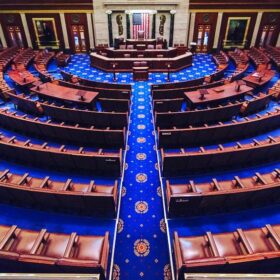Home and business owners who install solar on their roofs often don’t think a lot about large power lines that connect distant power plants to their homes. However, like all electricity customers, owners of grid-tied PV systems help to pay for these lines.
Yesterday a bill passed the California Senate which solar advocates say will help to more equitably distribute charges for long-distance transmission, by exempting the electricity produced by rooftop solar from these charges. Clean Coalition, which backed SB 692, says that the current system which places these charges on both electricity produced on-site and by distant power plants is unfair and distorts the market.
“It’s akin to levying the Golden Gate Bridge toll every time Bay Area residents pull into their driveways, as opposed to charging the toll only when crossing the bridge,” states Clean Coalition in a post on its website.
Clean Coalition also notes that this system is not used in every part of the state, and that instead the “user-pays” approach in SB 692 is already used by many public utilities. “(California’s grid operator) is fully capable of applying transmission charges on a “user-pays” basis and already does so for most municipal utilities in California,” notes the organization.
Clean Coalition notes that this will be a boost to the economics of rooftop solar, which have been weakened by the recent move to Net Metering 2.0 in most of the state. The organization estimates that transmission charges add around $0.03 per kilowatt-hour to the levelized cost of electricity under a 20-year contract, or around 30% of the wholesale value.
“SB 692 consistently aligns transmission costs with transmission usage and eliminates the massive market distortion that currently penalizes local generation in major utility service territories across California,” said Clean Coalition Executive Director Craig Lewis.
“Transmission costs are exorbitant and growing faster than any other component of energy pricing, and the SB 692 fix is essential for local renewables to fulfill their unparalleled potential to provide economic, environmental, and resilience benefits.”
California State Senator Ben Allen (D-Santa Monica), who introduced the bill, says that this move will be important for reaching California’s ambitious renewable energy goals. “The cost of local renewable power is currently being driven up by unfair transmission charges that subsidize polluting power plants,” states Allen.
“If we are going to meet our state’s goal of 50% clean energy by 2030, or even go beyond that, we need to make sure renewable power is not saddled with extra fees that artificially inflate its price and make it less affordable.”
SB 692 now moves on to the California Assembly, and if it passes that body will need the signature of California Governor Jerry Brown (D) to become law.
This content is protected by copyright and may not be reused. If you want to cooperate with us and would like to reuse some of our content, please contact: editors@pv-magazine.com.








By submitting this form you agree to pv magazine using your data for the purposes of publishing your comment.
Your personal data will only be disclosed or otherwise transmitted to third parties for the purposes of spam filtering or if this is necessary for technical maintenance of the website. Any other transfer to third parties will not take place unless this is justified on the basis of applicable data protection regulations or if pv magazine is legally obliged to do so.
You may revoke this consent at any time with effect for the future, in which case your personal data will be deleted immediately. Otherwise, your data will be deleted if pv magazine has processed your request or the purpose of data storage is fulfilled.
Further information on data privacy can be found in our Data Protection Policy.